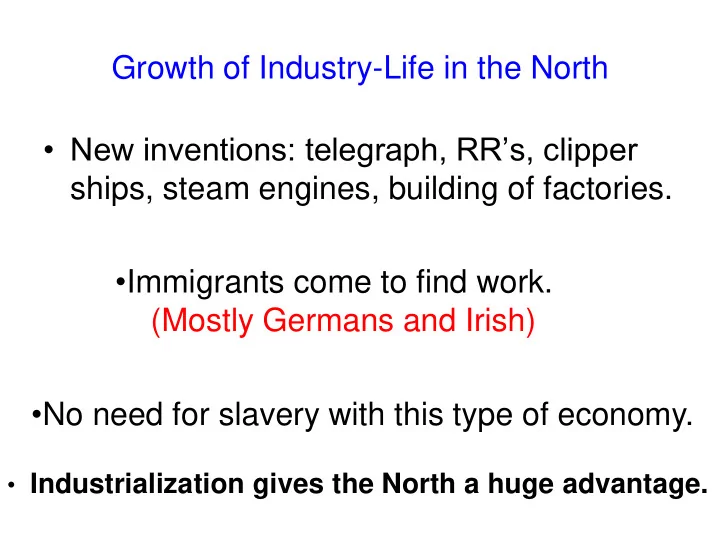

Growth of Industry-Life in the North • New inventions: telegraph, RR’s, clipper ships, steam engines, building of factories. • Immigrants come to find work. (Mostly Germans and Irish) • No need for slavery with this type of economy. • Industrialization gives the North a huge advantage.
A slave on the auction block. SLAVERY: FAMILY LIFE • Plantation owners dominate society • Slaves forbidden to be taught to read and write.
Ways of Rebelling
DRED SCOTT DECISION • A slave who sued for his freedom because he lived in free territory. • Court declares he is property, therefore, he doesn’t have the right to sue. DRED SCOTT
• Author of: Uncle Tom’s Cabin • Changed the way people thought about slavery • Sold over 2 million copies. Harriet Beecher Stowe
•Led a slave revolt at Harper’s Ferry, VA • He is captured and executed • Becomes a martyr for the abolitionists
• Career politician from Kentucky • Responsible for the Compromise of 1850 – Missouri Compromise • Lost three pres. Elections: 1824, 1832, 1844 HENRY CLAY “I’d rather be right than be president.”
• Coined phrase “Popular Sovereignty”: The voters in a territory would decide if slave or free. • Debated Lincoln in 1858 • Loses Pres. Election of 1860 to Lincoln STEPHEN DOUGLAS: “The Little Giant”
ELECTION OF 1860 • Democrats split over slavery. Lincoln wins with only 40% of popular vote. • He is not on the ballot in 10 southern states. South vows to secede.
FORMATION of the CONFEDERACY President Jefferson Davis • South Carolina secedes Dec. 1860 • 10 more states join • Jefferson Davis is chosen as president.
FORT SUMTER • Confederacy bombs this federal fort on 4-12-1861 • Sumter destroyed, no deaths • Significance: War begins
ABRAHAM LINCOLN • 16 th President • Assassinated a week after the war
JEFFERSON DAVIS • President of the Confederacy • Held captive for 2 years after the war
George McClellan •Union’s first commander • Fired by Lincoln, rehired, then fired again •“Lil Mac” “Young Napoleon” • Known for being a great organizer; unwilling to fight • Lost Election of 1864
Ulysses S. Grant • Commander of Union after Lincoln fires many. • Lee surrenders to him at Appomattox. • Becomes 18 th President.
ROBERT E. LEE • Lincoln asks him to lead the Union. He declines, refusing to fight against home state of Virginia.
Thomas “Stonewall” Jackson • Killed by “friendly fire” at Chancellorsville
WILLIAM TECUMSEH SHERMAN • At Shiloh, Vicksburg, Atlanta • 2 nd in command at wars end •“Total Warfare”: Destroy anything of use to the enemy
Led “doomed” Pickett’s Charge at Gettysburg George Pickett
CLARA BARTON “The Angel of the Battlefield” Founder of the American Red Cross
Julia Ward Howe: Wrote the song, “Battle Hymn of the Republic”
William Carney: First black American to receive the Congressional Medal of Honor – part of 54 th Massachusetts
Philip Bazaar: Hispanic who carried dispatches during attack on Ft. Fisher.
Life of a Soldier Clothing, Living Conditions: Incredibly young, most likely to die of dysentery. Food: Not very good, Pay $12 a month Entertainment: Drinking and gambling were big problems.
• Very primitive Medicine During the Civil War • Infection treated by amputation.
UNION and CONFEDERATE Strategy to Win Anaconda Plan Union: #1 block southern ports #2 seize control of Mississippi River #3 capture Confederate Capitol of Richmond Confederacy: would fight a defensive war and hope the North gives up.
1 st Bull Run July, 1861 • 5000 casualties • Both sides inexperienced • South wins •Picnics, “Stonewall” •Union embarrassed, called “The Great Skedaddle” • War will last longer than anyone thought
SHILOH April, 1862 • Union: Grant Confederacy: Johnston • Fought to gain control of Tenn. River. • Over 24,000 casualties. • Texan, Albert Sydney Johnston killed. • More casualties than all previous American wars combined Union victory
Andersonville Prison • Confederate prison in Georgia • Built for 10,000; 32,000 held there • Horrible living conditions, almost 13,000 die
Antietam, Md September 1862 Union: McClellan Confederacy: Lee • Turns out to be a draw. 23,000 casualties in one day • The bloodiest day in American history • Lincoln issues the Emancipation Proclamation
Gettysburg, Pa July 1 2 3 1863 Union: Meade Confederacy: Lee • Confederacy looking for shoes. •51,000 casualties. Pickett’s Charge. • Turning point of the war: Confederacy no longer on the offensive. • Lincoln gives a speech (Gettysburg Address) to honor the dead: “Four score and seven years ago…”
Vicksburg July 1863 Union: Grant Confederacy: Pemberton • Vicksburg is an impenetrable fort on the Mississippi • Grant starves the town into surrendering • Confederacy split in two.
Sherman’s March to the Sea Nov. -Dec. 1864 • Atlanta captured Sept. 1864 • Destructive march through Georgia 40 miles wide, 400 miles long
Appomattox Court House/Surrender April 1865 • Richmond falls April 2, 1865 • Lee surrenders: War is over.
Battle Summaries • Fort Sumter, SC (April, 1861) First battle • First Bull Run VA (July, 1861) First major battle. • Shiloh, TN (April, 1862) More casualties than all previous wars combined. • Antietam, MD (Sept, 1862) Bloodiest day in American history. Lincoln issues Emancipation Proclamation. • Gettysburg, PA (July, 1863) Turning point of the war. • Vicksburg, MS (July, 1863) Union gains control of Mississippi River. •Sherman’s March to the Sea, GA (Nov -Dec, 1864) Confederate resources are destroyed. • Appomattox, VA (April, 1865) Lee surrenders to Grant. Union wins.
Weapons of the Civil War • Technology of gun had far surpassed method of fighting.
Recommend
More recommend